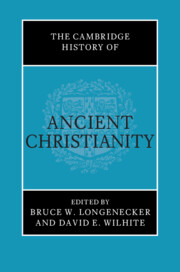Book contents
- The Cambridge History of Ancient Christianity
- The Cambridge History of Ancient Christianity
- Copyright page
- Contents
- Figures
- List of Contributors
- Editors’ Preface
- Part I Contested Contexts
- 1 The History of Ancient Christian History
- 2 The Present and Future of Ancient Christian History
- 3 Depicting the Other in Early Christian Polemic
- 4 Why Did People Become Christians in the Pre-Constantinian World?
- Part II Contested Figures
- Part III Contested Heritage
- Part IV Contested Cultures
- Part V Contested Beliefs
- Part VI Contested Bodies
- Ancient Sources
- Modern Authors
- References
3 - Depicting the Other in Early Christian Polemic
Christian Rhetoric and Identity in the Early Heresiologists
from Part I - Contested Contexts
Published online by Cambridge University Press: 23 August 2023
- The Cambridge History of Ancient Christianity
- The Cambridge History of Ancient Christianity
- Copyright page
- Contents
- Figures
- List of Contributors
- Editors’ Preface
- Part I Contested Contexts
- 1 The History of Ancient Christian History
- 2 The Present and Future of Ancient Christian History
- 3 Depicting the Other in Early Christian Polemic
- 4 Why Did People Become Christians in the Pre-Constantinian World?
- Part II Contested Figures
- Part III Contested Heritage
- Part IV Contested Cultures
- Part V Contested Beliefs
- Part VI Contested Bodies
- Ancient Sources
- Modern Authors
- References
Summary
The same man [Hegesippus] also sets out the origins of the contemporary heresies as follows: After the martyrdom of James the Just, for the same reason as that of the Lord, his uncle’s son Symeon, son of Clopas, was then made bishop. Everyone chose him next as he was cousin of the Lord. For this reason they called the Church “virgin,” since it had not yet been corrupted by empty rumors. Then Theboutis, because he had not been made bishop, began to corrupt it through the seven sects [haireseis] among the people, out of which he himself came, and from which there came Simon, from whom the Simonians sprang, Cleobius, from whom the Cleobians, Dositheus, from whom the Dosithians, Gorthaius, from whom the Gorathens and Masbotheans. From these came the Menandrianists and Marcianists and Carpocratians and Valentinians and Basileidians and Satornilians, each introducing their own doctrine distinctively and differently, and from them false Christs, false prophets, false apostles, who split the unity of the Church asunder with destructive statements against God and his Christ.1
- Type
- Chapter
- Information
- The Cambridge History of Ancient Christianity , pp. 57 - 79Publisher: Cambridge University PressPrint publication year: 2023

